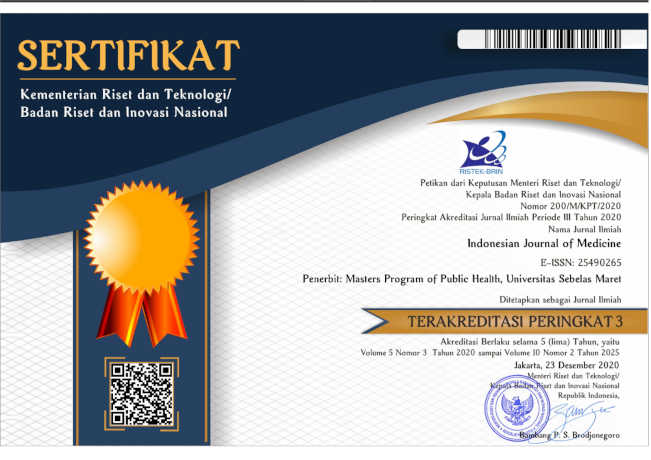Effect of Dhikr on Blood Pressure in Pregnant Women with Hypertension
DOI:
https://doi.org/10.26911/theijmed.2020.5.1.268Abstract
Background: Hypertension is a 5-10% of complications in pregnancy and is one of the most common causes of death besides bleeding and infection, and also contributes to the morbidity and mortality of pregnant women. The purpose of this study was to examine effect of dhikr on blood pressure in pregnant women with hypertension.
Subjects and Method: This was an experimental study conducted in Banjarnegara district health center, Central Java, in June 2018. A sample of 30 pregnant women with hypertension was selected for this study randomly. The dependent variable was blood pressure. The independent variable was dhikr. Blood pressure was measured by sphygmomanometer. Mean difference between of systolic and diastolic blood pressure in two groups after intervention was tested by t test.
Results: After intervention, diastolic blood pressure in the intervention group (Mean= 136.67; SD= 6.17) was lower than in the control group (Mean= 141.33; SD= 5.16), and it was statistically significant (p= 0.006). After intervention, diastolic blood pressure in the intervention group (Mean= 88.67; SD= 3.52) was lower than in the control group (Mean= 92.00; SD= 4.41), and it was statistically significant (p= 0.025).
Conclusion: Dhikr decreases blood pressure in pregnant women with hypertension.
Keywords: blood pressure, hypertension, pregnant women
Correspondence:
Dian Nirmala Sari. Applied Midwifery, Graduate Program, School of Health Polytechnics, Ministry of Health Semarang. Jl. Tirto Agung, Pedalangan, Banyumanik, Kota Semarang 50268, Central Java, Indonesia. Email: nirmalasaridian@yahoo.co.id
Indonesian Journal of Medicine (2020), 05(01): 87-94
https://doi.org/10.26911/theijmed.2020.05.01.12
References
Anderson JW, Liu C, Kryscio RJ (2008). Blood pressure response to transcendental meditation: A meta-analysis. Am J Hypertension. 21(3): 310–316. https://doi.org/10.1038/ajh.2007.65
Banjarnegara District Health Office (2016). Profil Kesehatan (Banjarnegara health profile).
Beevers G, Lip GYH, O'Brien E (2001). The pathophysiology of hypertension. BMJ. 322(7291): 912–916. https://dx.doi.org/10.1136%2Fbmj.322.7291.912.
Benson H, Nilandari A, Nurhasan, Proctor W (2000). Dasar-dasar respons relaksasi: bagaimana menggabungkan respons relaksasi dengan keyakinan pribadi anda. Bandung: Kaifa.
Brook RD, Appel LJ, Rubenfire M, Ogedegbe G, Bisognano JD, Elliott WJ, Fuchs FD, Hughes JW, et al. (2013). Beyond medications and diet: Alternative Approaches to lowering blood pressure. A scientific statement from the American Heart Association. Hypertension. 61: 1360-1383. Doi: 10.1161/HYP.0b013e318293645f
Brown MA, Magee LA, Kenny LC, Karumanchi SA, McCarthy FP, Saito S, Hall DR, et al. (2018). Hypertensive disorders of pregnancy: ISSHP classification, diagnosis, and management recommendations for international practice. Hypertension. 72: 24-43. Doi: 10.1161/HYPERTENSIONAHA.117.10803.
Cunningham FG, Leveno KJ, Bloom SL, Dashe JS, Hoffman BL, Casey BM, Spong CY (2014). Williams Obstetrics 25th ed. Texas: Mcgrawhill.
Delacroix S, Chokka RG, Worthley SG (2014). Hypertension: Pathophysiology and Treatment. J Neurol Neurophysiol, 5: 6. Doi: 10.4172/21559562.1000250.
Goldstein CM, Josephson R, Susan Xie S, Hughes JW (2012). Current perspectives on the use of meditation to reduce blood pressure. https://doi.org/10.1155/2012/578397
Haryono R, Permana I, Chayati N (2017). Pengaruh kombinasi pijat punggung dan dzikir terhadap tingkat stres pada penderita hipertensi. Jurnal Keperawatan Notokusmo, 5(1): 1–6.
Levine GN, Lange RA, Bairey Merz CN, Davidson RJ, Jamerson K, Mehta PK, Michos ED, et al. (2017). Meditation and cardiovascular risk reduction. J Am Heart Assoc. 6(10): e002218. https://doi.org/10.1161/JAHA.117.002218
Ministry of Health (2013). Buku saku pelayanan kesehatan ibu di fasilitas kesehatan dasar dan rujukan. Jakarta: Indonesian Ministry of Health.
Ministry of Health (2014). Mother’s day situasi kesehatan ibu. Infodatin. Jakarta: Indonesian Ministry of Health.
Kowalak JP, Welsh W, Mayer B (2011) Buku ajar patofisiolog. Jakarta: EGC.
Lindheimer MD, Taler SJ, Cunningham FG (2008). Hypertension in pregnancy. J Am Soc Hypertension. 2(6): 484-494. https://doi.org/10.1016/j.jash.2008.10.001
Lu S, Donglan Z, Liang W, Junyang Z, Rebecca C, Liwei C (2017). Meditation and blood pressure a meta-analysis of randomized clinical trials. J Hypertension, 35(4): 696-706. doi: 10.1097/HJH.0000000000001217
Mirzaei T, Nematollahi M, Sabzevari S, Dehghan S, Soleymanpour MJ (2015). Short term effects of islamic zikr on anxiety, stress, and depression in mothers of children with congenital heart disease. British J Med Medical Research. 10(4): 1-5. https://doi.org/10.9734/BJMMR/2015/19526
Nasiri M, Naboureh A, Fayazi S (2017). The effect of an islamic praise (Zikr) on postoperative anxiety of patients undergoing coronary artery by passes graft surgery: A randomized clinical trial on Iranian Shia Muslims. Research in Cardiovascular Medicine, 6(3): 4. Doi: 10.5812/cardiovascmed.41388
Pahlevi R, Putra ST, Sriyono (2017). Psychoneuroimmunology approach to improve recovery motivation, decrease cortisol and blood glucose of DM type 2 patients with dhikr therapy. Jurnal Ners. 12(1). http://dx.doi.org/10.20473/jn.v12i1.2315
Provincial Health Office of Central Java (2013). Profil kesehatan provinsi jawa tengah tahun 2012. Semarang: Dinkes Jateng.
Seely EW, Ecker J (2014). Chronic Hypertension in Pregnancy. Circulation. 129(11): 1254–1261. https://doi.org/10.1016/j.ajog.2019.11.1243
Tangsangwornthamma T (2018). A qualitative study on belief, perception, and health effects on standing zikr among Thai muslims in Nakhon Nayok Province. Psychology Research. 8(11): 544-557. doi:10.17265/21595542/2018.11.002
WHO (2013). A global brief on hypertension. https://www.who.int/cardiovascular_diseases/publications/global_brief_hypertension/en/
WHO (2017). Pocket book of hospital care for mothers. World Health Organization. Regional Office for South-East Asia. https://apps.who.int/iris/handle/10665/258716.











